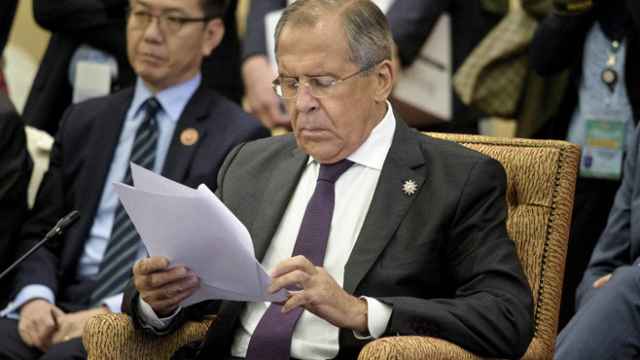Russia's disintegrating financial system aside (don't tell me you didn't see it coming), the news of the week was definitely the Vasilyeva/Sentsov court combo. Yevgenia Vasilyeva, the ex-girlfriend of a former defense minister, walked out of jail after serving 109 days for embezzling 293 million rubles ($4.2 million). On the same day, Oleg Sentsov, a Ukrainian filmmaker who protested Russia's annexation of Crimea last year, got 20 years for terrorism over an alleged attack on United Russia party's office that destroyed a chair.
This is definitely one court case — or rather, one court message, and let the Unfair Observer decrypt it for you, because it has precise numeral value. An office chair at a Russian Ikea costs about 5,000 rubles ($72) — which means the damage inflicted by Sentsov was 58,600 times smaller (imagine that many chairs), but punished 67 times harder than Vasilyeva's economic shenanigans.
Also, in the case of Vasilyeva, $29,000 earns you a day in jail, while for Sentsov, one day behind bars costs a mere cent — talk about austerity! This is the difference between economic and political damage in Russia.
All of which will be relevant when the people disgruntled by the falling ruble begin looting governmental offices. Anyone's guess if it'll be considered economic or political damage — but given that not many of them are likely to be ministerial ex-girlfriends, Sentsov can expect a lot of company.
But for now, the government is trying its best to impose law and order on the reluctant world.
Stop the Crazy Cat Ladies
Two days after Black Monday, when the ruble lost 30 percent of its value against the dollar, and a year before the elections, the State Duma finally stumbled upon the root of all problems: cats.
Some people keep them, you see. And some keep dozens of felines — which cannot be tolerated, so the parliament is considering a cap on the number of animals you can have in your apartment. The deputy head of the Duma's constitutional commission said the issue is "overripe," and a new law is expected any day now.
With this, Russia seems on track to be the first country to make it a constitutional right to not have to live next to a crazy cat lady. And indeed, what other issues are there to address? It's all quiet in Mother Russia, nothing stirs the stability, except for wicked meowing in the night — but that will soon be over too.
Perhaps the Duma also needs to regulate nutrition for pet hamsters and issue a prohibition on owning an apartment without a rug. And then the only problem will be staving off the endless wave of migrants from the European Union and the United States looking for a piece of Russian joy and prosperity. Except for the Western cat ladies, of course. Tough luck, ladies.
Riots on Wheels
Russian police also have ideas about how to make life better and more peaceful — and that is by curbing the danger of bike rides and wedding processions. A new draft law approved by the government says any gathering on wheels can constitute "a new form of protest activity" and might disintegrate into public rioting.
So now you will need a permit for that weekend ride with your friends, and you will have to prove to the police that your wedding motorcade is not an act of protest against the Central Bank's fiscal policies. Wheelchairs and skateboards are exempt for now, but they still have time to rectify this.
Not even the most fringe, radical, out-there political activists in Russia have seen it coming, but the police know the revolution will be riding a bicycle. Lenin himself rode one! And they already have bicycle lanes in Moscow — a clear sign of upcoming rebellion. Thanks God the motorists have occupied them all.
But don't stop there. Any bicycle is danger — but so is any gathering of multiple Russians, on wheels or on foot. Any such gatherings should be prohibited and dispersed by force before it's too late. This will put an end to the Duma and the government, but that'll only make it easier for the Kremlin anyway. Everybody else should go home and pet their solitary cat.
Non-Stop Urinating
Russia almost banned Wikipedia this week, but chickened out at the last minute. The war on the Internet did not stop there, however — Security Council head Nikolai Patrushev demanded that Russian regional officials stop using Google and WhatsApp at work because Western secret services use them to spy on Russian bureaucrats in Komsomolsk-on-Amur. He did not suggest any alternatives.
Meanwhile in Siberia, a local man caused a district blackout by urinating on a power transformer. The man survived. Local authorities even claimed he was sober at the time, though this sounds far-fetched.
The Siberian fellow and his compatriots in high places show the same level of understanding of modern technology. Of course, sharing classified information on Google is stupid — but if your men don't know that, fire them and hire new ones, who know how stop the paranoia and how to use Gmail and instant messengers productively. And power transformers, for that matter.
Too many officials seem engaged in urinating on anything that still works in Russia, and the last thing the country needs right now is more blackouts.
Unfair Observer is the pen name of a Russian journalist that The Moscow Times has invited to observe the most brain-dead weekly developments in Russia.
A Message from The Moscow Times:
Dear readers,
We are facing unprecedented challenges. Russia's Prosecutor General's Office has designated The Moscow Times as an "undesirable" organization, criminalizing our work and putting our staff at risk of prosecution. This follows our earlier unjust labeling as a "foreign agent."
These actions are direct attempts to silence independent journalism in Russia. The authorities claim our work "discredits the decisions of the Russian leadership." We see things differently: we strive to provide accurate, unbiased reporting on Russia.
We, the journalists of The Moscow Times, refuse to be silenced. But to continue our work, we need your help.
Your support, no matter how small, makes a world of difference. If you can, please support us monthly starting from just $2. It's quick to set up, and every contribution makes a significant impact.
By supporting The Moscow Times, you're defending open, independent journalism in the face of repression. Thank you for standing with us.
Remind me later.






